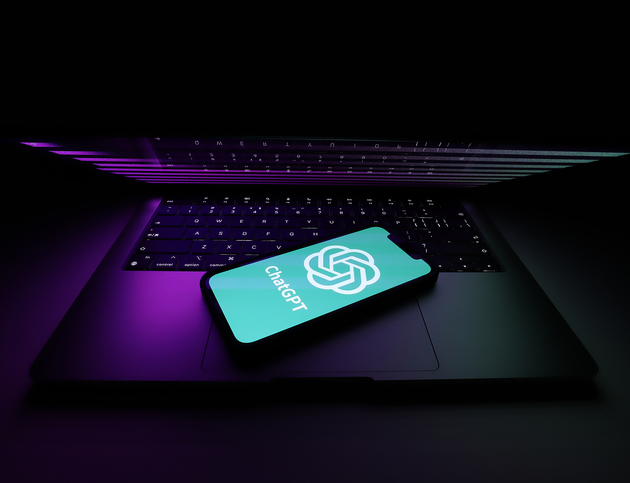
Photo/VCG
OpenAI launched a simple custom GPT tool (GPTs) at its first developer conference, sparking a development craze. The number of GPTs reached 15,000 in a week. Fortune-telling, resume writing, one-click price comparison of products, developers unleash their creativity with the help of technology. OpenAI’s servers could not handle it, and had to suspend the registration of ChatGPT Plus accounts with development permissions.
Leo Feng, an AI technology blogger who works for a large AI company in China, told NBD that the launch of GPTs had a “complete crush” on chatbot and vertical domain AI developers, reflecting OpenAI’s ambition to become the next generation platform. However, the commercialization of GPTs ecosystem has not been realized yet, and GPTs are in the “power generation for love” stage. How to become a real money-maker after the excitement, perhaps exclusive professional databases are the competitive barriers.
A GPTs every three minutes, OpenAI forced to suspend registration
OpenAI launched a custom GPT feature at its first developer conference just a week ago, and the influx of developers overwhelmed the servers. On November 15, Altman had to announce that he was suspending new user registration for ChatGPT Plus. This feature is the paid version of ChatGPT, with a monthly fee of $20, and only by opening it can you develop custom GPTs and use GPTs developed by others.
“Due to the surge in usage after OpenAI Development Day exceeding our capacity, we want to ensure everyone has a good experience. You can still register for ChatGPT in the app to be notified when ChatGPT Plus reopens.”

As of press time, ChatGPT Plus has not reopened registration and requires queuing.
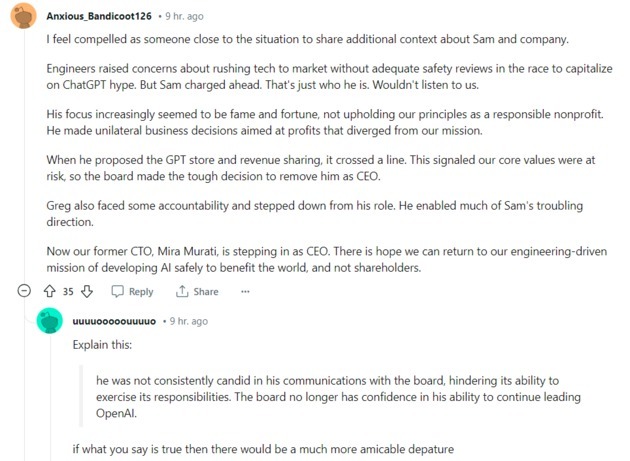
As soon as the news came out, many people who already had Plus accounts expressed their relief, and some even started selling accounts online.
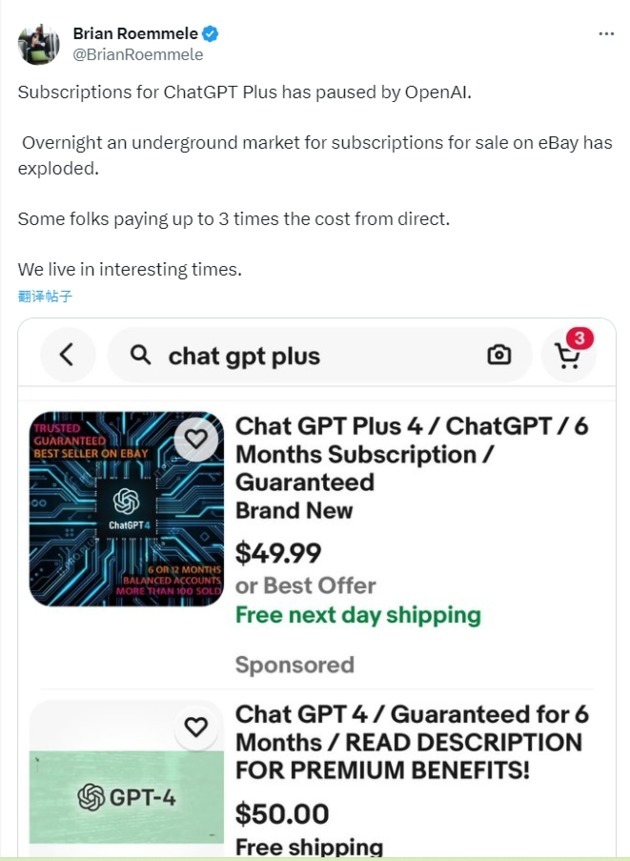
“Interesting. Glad I subscribed. Don’t like the word limit.” A netizen commented below.

As OpenAI suspended subscriptions, some said the opportunity for competitors had arrived. Jim Fan, a senior AI scientist at Nvidia, tweeted:
"Anthropic and Gemini (Google AI projects) window of opportunity? I just found out that Claude (Anthropic’s AI product) actually has a $20/month professional version… If they add browsing, code interpretation, plugins, they can be strong competitors. These things are very simple shell functions, not hard to add.
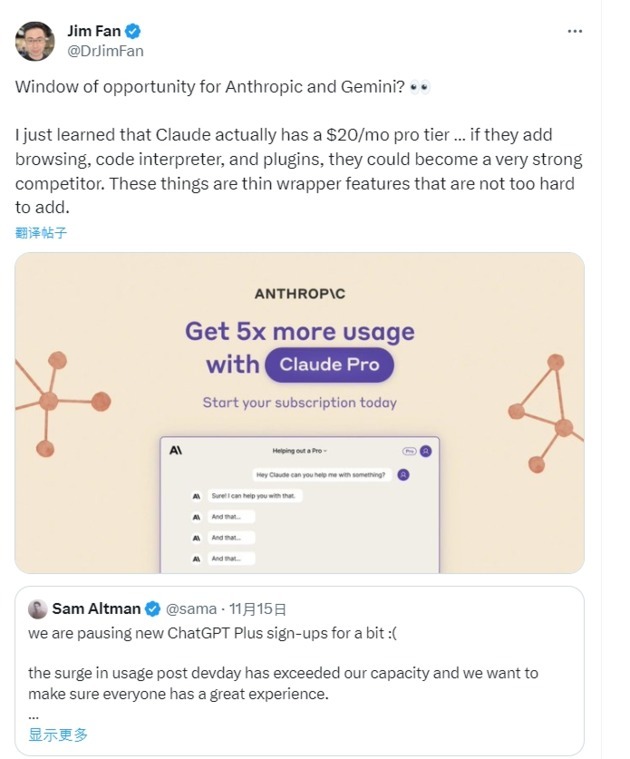
"While new users are queuing up for numbers, old users have developed wave after wave of GPTs. The official GPT Store has not yet launched, and the third-party developed website GPT Hunter has already included 15,000 GPTs, and is still growing. And according to the third-party website allgpt.co, the upload speed of GPTs is as high as one every three minutes.

Through OpenAI’s GPT Builder, developers can communicate their needs directly with ChatGPT in natural language without having to understand programming languages, and generate their own GPTs. In addition, developers can also input a large number of documents, making GPTs more adapted to specific domain knowledge and more targeted.
The lowering of the technical threshold has brought more creative ideas to the ground, covering programming, writing, education, gaming, design and other fields. Dream interpretation, fortune-telling, cocktail mixing, dialogue with Socrates, love companionship, netizens’ imagination has no limits.
For example, Maxwell Timothy developed a GPTs called “Resume Master”. He put dozens of resumes he had written before into the system, and added online resume examples and his own work experience. This way, he only needs to enter the job details in the recruitment, and “Resume Master” can generate a downloadable PDF resume document in 10 seconds, containing all the personal information, and listing the work experience according to the job requirements. “Basically the same as what I wrote myself, only need very little modification,” Timothy said.
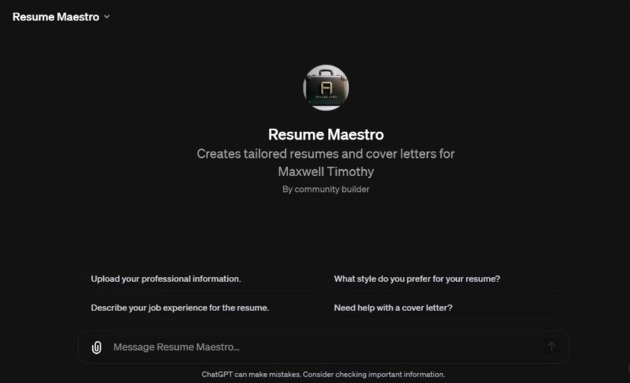
For those who want to find a job, they can generate customized resumes according to different job requirements in a very short time, which undoubtedly greatly improves efficiency.
Technology blogger Quinn Leng’s tool “Chop Hand GPT” is a very practical shopping assistant. You only need to take a picture of the item, and “Chop Hand GPT” can automatically identify the product name, and then compare prices across the web, providing purchase advice. In addition, the GPTs also provides a “buy the same” function by looking at the picture.
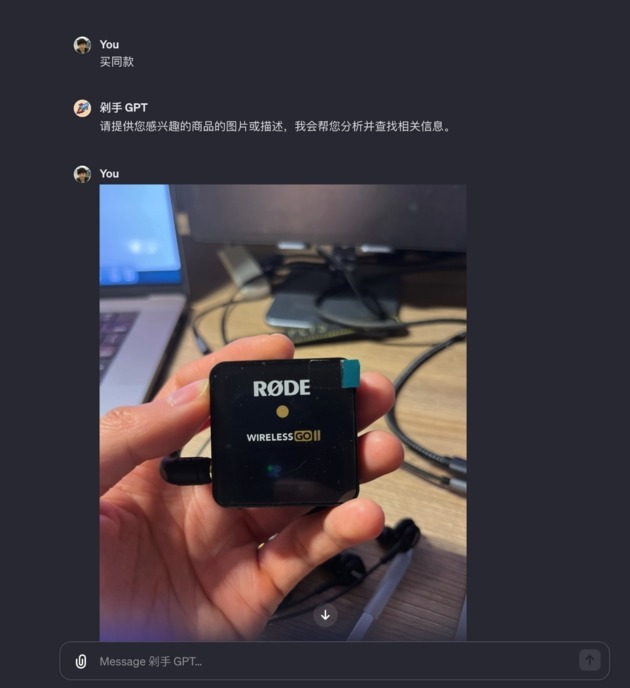
“It works really well. If you add Amazon affiliate link (share link) I feel like you can make money by selling goods,” Quinn Leng said on social media.
Choi Yong’s “Book Creator’s Guide” covers the steps of topic selection, book outline, AI-generated content and image creation, making writing books no longer a difficult task.
The next platform is coming?
As the leader of generative AI, OpenAI’s series of heavy updates have already caused waves in the AI industry. On November 16, at the Microsoft Ignite conference for developers and IT professionals, Microsoft also launched a low-code customized Copilot development tool Microsoft Copilot Studio, which is seen as equivalent to GPTs development tool. In fact, Microsoft also supports seamless integration of OpenAI’s services, and creators will be able to build their own custom GPTs in Copilot Studio.
Leo Feng, an AI technology blogger who works for a large model unicorn company in China, told NBD that OpenAI’s launch of custom GPTs and Assistant API will have a great impact on AI entrepreneurs. The first is the small and medium-sized developers who make chatbots, they package prompts into chatbots, and GPTs’ technology completely crushes this kind of products, vertical AI developers, such as US stock earnings analysis AI tools, will also be directly squeezed by GPTs. The intermediate layer platform that simplifies the use of ChatGPT API, such as Langchain and DIFY, are also completely crushed by Assistant API, because the latter has more advantages in cost and technology.
“The GPT Store ecosystem will have a great impact on the entire AI industry. Sam (Altman) had said before that OpenAI would only make one product, ChatGPT, but GPT Store obviously violated this statement, and actually became an AI platform. In GPT Store, everyone can be a developer, and can make their own AI, which will further consolidate OpenAI’s monopoly position.” Leo Feng said.
Bill Gates, who is equally enthusiastic about generative AI, believes that OpenAI’s release of GPTs allows us to “get a glimpse of the future”.
He said in a recent article that he has been thinking about agents for 30 years, and the current technology still requires switching between different software to complete different tasks, and cannot fully understand the user’s personal information and preferences, “still quite stupid”, but today’s GPTs can make people foresee the future. The so-called agent refers to a tool that can respond to natural language and complete many different tasks based on the user’s understanding.
In Gates’ view, AI-driven “agents” will become the next platform after Windows and Android/iOS systems.
In fact, at the developer conference, Altman also directly linked GPTs and Assistant API to agent development, believing that these tools can greatly simplify the development process. However, perhaps he thinks that the current development situation has not reached the ideal level of agents, Altman still chose GPTs, a bland name.
However, beyond the beautiful vision, the current GPTs craze is still in a process of tasting and experiencing, and the future commercial prospects are still to be further observed.
CMB Securities pointed out in a research report that GPTs is indeed a start-up platform comparable to APPs (mobile applications), but currently a large number of GPTs are very simple, basically based on ChatGPT’s original database and search and answer to create vertical applications, so the number of massive level increase is not surprising, but “most of the GPTs are expected to have very little traffic, and charging is even more difficult”.
Leo Feng also believes that GPT Store has not yet achieved commercialization, and the subsequent development situation is uncertain, and the user-generated GPTs are still in the “power generation for love” stage, “but if you want to develop well, you need to let users also get income from it”.
Leo Feng has already played with a few GPTs he collected, and he said that he was still far from his expectations and was disappointed. “This week’s GPTs feel like things that domestic products have played with, just added pictures, and became a little better. This week, except for entertainment GPTs, there is not much else to spread.” He believes that for institutional developers, Assistant API is very easy to use, but ordinary users want to make money by GPTs is very difficult.
How to become the ones who can make money after the craze subsides? CMB Securities believes that the most critical must be the vertical GPTs developed on the basis of exclusive professional data, which can form competitive barriers and characteristics.


 川公网安备 51019002001991号
川公网安备 51019002001991号





